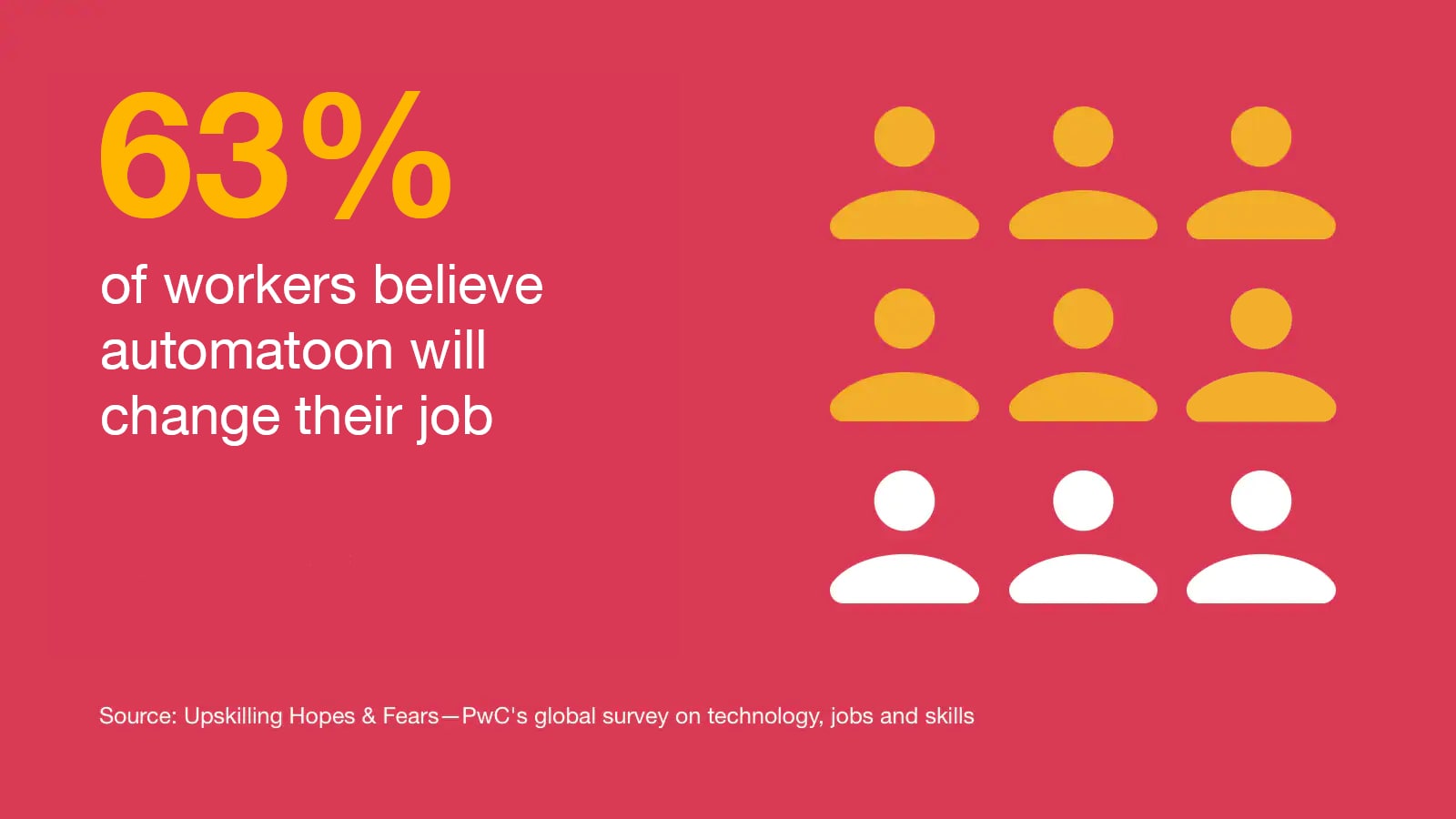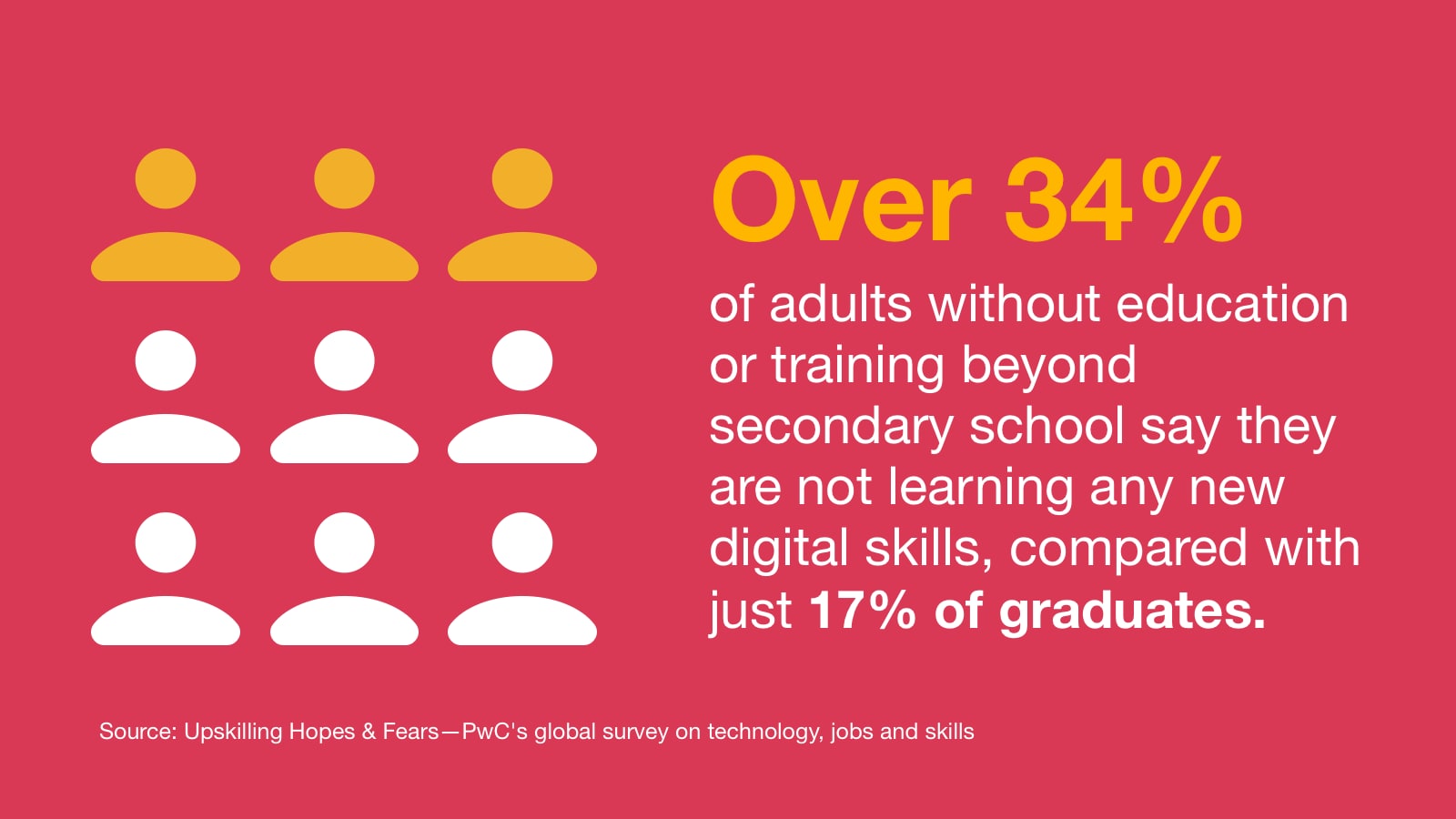Our jobs and roles change as new ones emerge. The discrepancy between the skills that people have and those needed for jobs in the digital world is one of the most common challenges of our time. The need for upskilling is a complex issue for which decision -makers - educators, business leaders and national, regional and local government officials - have to work together to find a solution.
Over the next few years, PwC Netherlands will be making a major effort in terms of upskilling. This money will be invested primarily in training our staff and in technologies to assist our customers and society. Together we can prepare employees for the future and create a more resilient, capable and inclusive world.
News world. New skills
A call to action
Is technology a positive or negative force? We have clearly reached a critical juncture: the new world urgently needs new skills and everyone must be given the opportunity to acquire them.
Duration: 00:02:57
What do people really think about the impact of technology on jobs?
In a recent survey, PwC asked 22,000 adults (excluding pensioners) in the United Kingdom, the United States, Germany, the Netherlands, Australia, France, China, India, South Africa, Singapore and Poland, about their hopes and fears. Of these 22,000 adults, 2010 were from in the Netherlands.

Change is inevitable
Employees realise that automation will change their jobs. They want to learn new skills to boost their employability.
- Whereas 63% of Dutch employees think automation will have an impact on their job, 10% are really worried when asked specifically about their own job.
- Among the countries surveyed, Dutch employees tend to regard upskilling as the responsibility of companies rather than of individuals (45%). The majority of other countries, including South Africa, the US and Germany, believe that this responsibility rests with the individuals themselves.

Digital skills are vital
- Most employees generally welcome new technologies. The majority (61%) are positive about the impact of technology on their day-to-day work. However, only one third of employees (33%) have the opportunity to develop digital skills alongside their own work.
- In the Netherlands, 75% of employees are optimistic about the future of technology and believe that technology in general will improve their day-to-day work and that they can now work more efficiently. Only 14% of Dutch adults think that technology has a negative effect on their day-to-day work.

More opportunities than risks
At least half of those surveyed believe that automation offers more opportunities than risks. They believe that automation will improve their job prospects and enable them to learn digital skills or become an expert.
- Worldwide, 50% of respondents believe that automation offers more opportunities than risks, whereas 20% believe the opposite.
- 60% of global respondents believe that technology will improve their job prospects, 26% say that it's hampering their future prospects and 14% don't think it will make any difference.
- Earning more is the biggest motivation for Dutch employees for undergoing skills training, with 22% of employees saying they would accept upskilling if they knew it would increase their earning potential.

Education is important
People's optimism is influenced by their level of education. Well-educated respondents are most optimistic about technology and their job prospects, even though they think their current job is likely to change significantly or even disappear. Young respondents prefer to develop a specific technological skill, while older respondents like to develop skills on the job when learning and adapting to new technologies:
- Fear is greatest where there are the least opportunities, i.e. among people whose formal education ended after high school.
- Worldwide, one third (34%) of adults with no education or training after high school say they are not learning new digital skills, compared with only 17% of college and university graduates.
- Employees with no tertiary education are also less likely to get such training opportunities from their employers (worldwide, 38% do not get such opportunities compared with 20% of graduates) and are the group most nervous or anxious about the future.

How do you start upskilling?
The digital revolution calls for a skills revolution. People need to develop their digital awareness, understanding and skills in order to participate in the digital world - and they need to start doing so now.
At PwC, we collaborate with other organisations around the world, building on our work with customers and upskilling of our 276,000 staff. However, we must do even more to ensure that everyone has the opportunity to learn, work and participate in the digital world. This is the essence of our goal.
- How are organisations improving their skills?
- How does PwC reach people who are in danger of being left behind?
- How can business leaders, governments and institutions work together to resolve this complex issue?
How are organisations improving their skills?
Organisations are transforming their workforce to drive productivity, innovation and growth. Upskilling is the key. It's all about anticipating the right skills for the future, laying the cultural foundations, providing modern training programmes and building a learning and development function with the right technology in order to provide a much better return on investment from upskilling.
Find out how we can help you with upskilling
How does PwC reach people who are in danger of being left behind?
The digital divide is a significant problem worldwide and will only widen if we fail to develop the right skills, both for those who are currently excluded and for new generations. We try to reach the target groups whose need is greatest:
Discover our community initiatives
How can business leaders, governments and institutions work together to resolve this complex issue?
Solutions to the challenge of upskilling must be developed at local, regional and national level. No organisation can do this alone.
Government leaders and policy makers need to ensure that they have the knowledge to encourage debate on the future of technology and regulations and to involve the public. Institutions, such as educational institutions, need to transform themselves digitally and at the same time offer services that are future-proof.
Read more about PwC's involvement in the Luxembourg Digital Skills Bridge project, a government-led initiative that brought together stakeholders from business, trade unions, and training providers to provide a comprehensive national solution for developing employee skills.
The need for upskilling is a complex issue for which decision-makers - educators, business leaders and national, regional and local government officials - have to work together to find a solution.
Contact us if you would like to know more about what we are doing at PwC.
Contact us
















